With global inflation hitting pretty much all of us nowadays, it’s no wonder affordable providers are gaining popularity. Some providers built their names upon cheap prices and lots of features despite the affordability.
If you’re looking for a great cheap VPN service, you might stumble upon CyberGhost and Surfshark. These two providers are the pinnacle of affordability and quality, offering thousands of servers, top-grade security, excellent streaming capabilities, and so much more for the price.
Today, my CyberGhost vs Surfshark VPN comparison for 2025 will tell you which provider is a better choice. They’re very similar in terms of pricing but their features, performance, and other factors are a lot different in some instances.
This makes the potential buyers very confused as to which VPN is better for the money. Needless to say, I will not only compare these two by talking about their features. I’ll also do practical testing for streaming and speeds, to make sure you get a full image of how well these providers work.
After reading this Surfshark vs CyberGhost comparison, you’ll have no doubts about which provider to use. But first, make sure you grab some food/drink, sit back, relax, and keep reading – it’s going to get very interesting!
12000 servers
100 covered countries
45 days money-back guarantee
7 simultaneous connections
9.2 /10
3000 servers
100 covered countries
30 days money-back guarantee
Unlimited connections
9.1 /10
CyberGhost vs Surfshark: Apps & Ease of Use
The app design of a VPN service is pretty important not only for attracting new users but keeping the old ones around. I always value smooth and enjoyable applications that I can use to connect to a server in no more than 3-4 clicks of a mouse.
However, another more important thing is device compatibility. Thankfully, in this CyberGhost vs Surfshark comparison, both providers show great performance in this regard. They both have apps for Windows, Linux, macOS, iOS, and Android. CyberGhost and Surfshark are even included in our ranking of the best VPNs for iPads.
Moreover, these providers have native apps for Fire TV Stick, Android TV, and other non-typical platforms. In fact, I found that these VPNs also work with Kodi and Apple TV, which is pretty convenient.
One thing where Surfshark beats CyberGhost is the number of simultaneous connections. I mean, Surfshark packs unlimited connections per account which is simply unbeatable. CyberGhost, on the other hand, has just 7 of them, which isn’t that limiting if you ask me.
However, compared to unlimited simultaneous connections, the limits of CyberGhost can be seen from a mile away.
CyberGhost
The overall user experience is great when using CyberGhost, albeit, I think it could be slightly better. In the screenshot below, I’m showing you its application on Windows, which also looks the same on macOS. It’s not very minimal like ExpressVPN’s app, for instance.
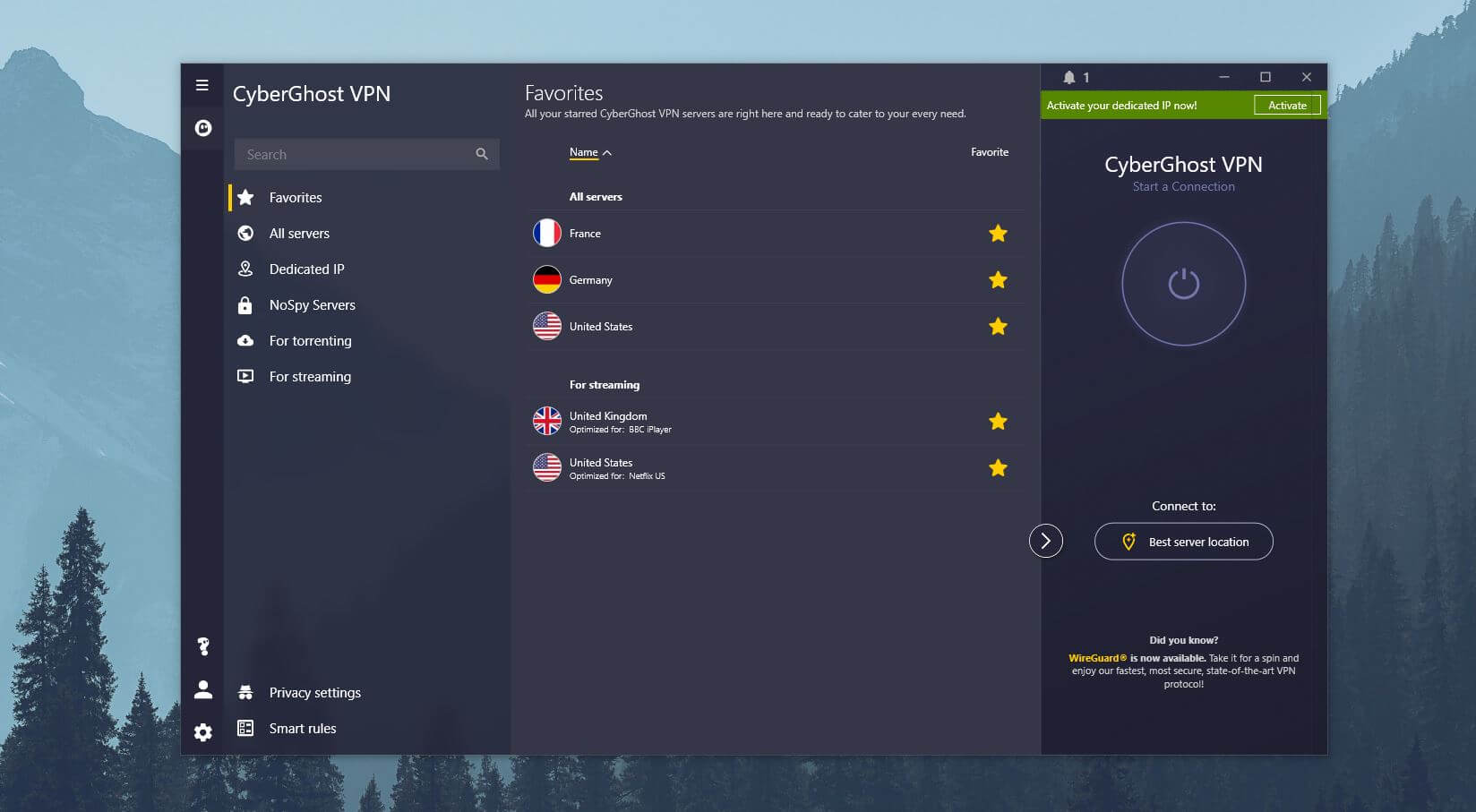
That’s not a problem because you have every menu, sub-menu, and functionality in one window! To connect to a server you want, simply click on All Servers, find the country, and double-click on it. This will connect you to a server in that country in about 3-5 seconds – not particularly fast.
The provider offers its specialty servers on the left-hand side of the app and here, you can choose torrenting, streaming, dedicated IP, and NoSpy servers. The Settings menu is where the provider drops the ball for me, as it has multiple menus and sub-menus which creates confusion.
Clicking on Smart Rules, you can enable something called Exceptions, which is split tunneling but also WiFi protection. Then, if you click on Privacy Settings, you can find an ad blocker, DNS leak protection, and an automatic kill switch.
Finally, clicking on the Gear icon gives you yet another Settings menu. In this menu, you can find protocol selection, disable IPv6 connections, and select MTU size. All of this is a bit confusing even for me who has been using CyberGhost for nearly TEN years!
They could’ve just put all of these features under a single Settings menu with two or three sub-menus and called it a day. On iOS and Android, this is put together better and you won’t have trouble finding the features and settings you want.
Surfshark
Surfshark is, for me at least, a better-looking VPN regardless of the platform we’re speaking about. Its application is a big window again, but you can resize it to your own accord and customize it by choosing from dark and white themes. I go for the dark one always.
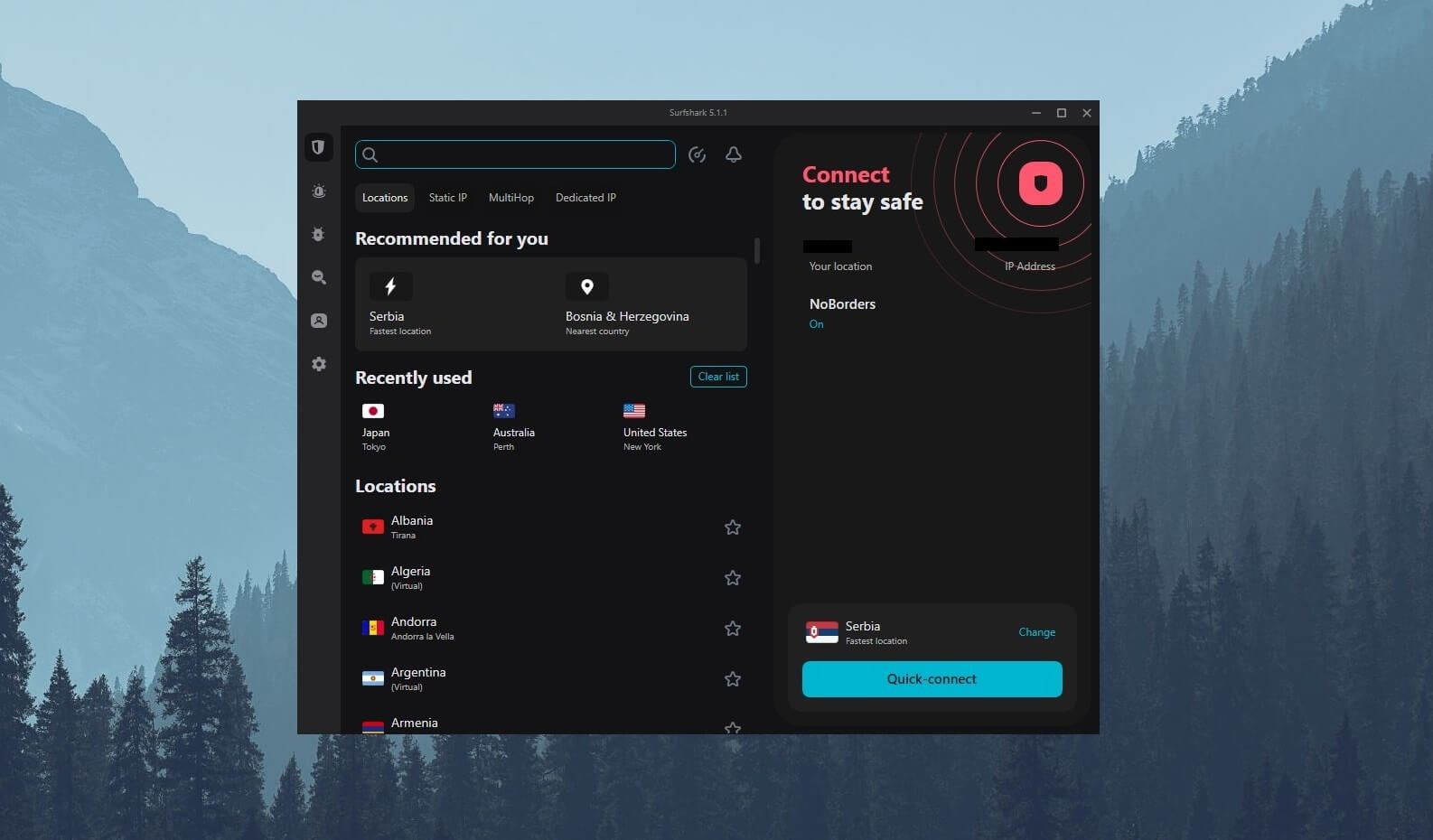
The server list resides in the middle of the home screen and one simple click connects you to a server in no more than 3 seconds – faster than CyberGhost. On the right side, you can see recently used servers, while at the top of the list, you can choose different types of servers.
Now, if you want to see more features and functionalities, there’s a Gear icon on the left-hand side of the app. By clicking on it, you’ll find a few menus but ALL VPN-related features can be found in a single menu – that’s what I want from CyberGhost too.
Here, you can find a kill switch, NoBorders mode, split tunneling, ad blocker, and everything else we’ll talk about later in the CyberGhost vs Surfshark comparison. Even its bonus Surfshark One features have their separate menus on the left, making the entire user experience much more intuitive.
Overall, I found Surfshark not only easier to use but better looking too. This applies to its mobile versions of the app that look the same, with the same set of features located in the same menus. As such, you’ll have no learning curve when switching from your PC to your phone and using this app.
Who Wins?
In the first round of comparison between Surfshark and CyberGhost, Surfshark WINS. It offers unlimited simultaneous connections and better apps. CyberGhost needs to improve its desktop apps and include more simultaneous connections if it wants to be at least on par with its opponent in this match.
Security & Privacy: Which One Is Safer to Use?
I often say that the first impression is crucial and that the first impression is gained through the apps. However, I also think that the security and privacy of a VPN service trump look because these parameters are the backbone of every VPN provider – or at least, they should be.
Security Features
With that in mind, I think it’s time to talk about the security features of these providers and see what they have to offer. Of course, being two providers in the same field of work, they share some of the features that I will first go through.
CyberGhost VPN and Surfshark come with AES-256 encryption, along with an automatic kill switch, split tunneling, IPv6/DNS leak protection, ad blocker, and support for WireGuard and OpenVPN. What’s more, WiFi protection is present on both providers, which is useful on untrustworthy WiFi networks.
Unlike NordVPN and ExpressVPN, these providers have no proprietary servers. But the good thing is that they both base their servers on Random Access Memory (RAM), which increases your privacy, as every bit of information is wiped from the server upon each restart.
A vital thing to mention is that both providers use proprietary DNS servers. They’re responsible for handling your DNS requests per their no-logs policies. This prevents third-party DNS services from handling, and by extension, seeing your DNS requests for added privacy.
What Are the Differences?
Now, as said, CyberGhost and Surfshark have some differences when it comes to security features. Let’s start with Surfshark. This provider is one of the most feature-rich VPNs for the price. In its application, you’ll find features like NoBorders mode, IP Rotator, and something called Surfshark One.
NoBorders mode is a feature you should enable when you want to bypass censorship in China or simply avoid firewall restrictions. Then, this IP Rotator feature is here, and it’s very interesting because it rotates your IP periodically while keeping your VPN location the same.
This makes it impossible to track your activities online, keeping you safe and secure all the time. Surfshark One is a bonus security bundle that comes in the Surfshark One plan consisting of features called Alert, Antivirus, and Search. Alert is the Dark Web Monitor functionality we’ve seen in NordVPN.
Antivirus needs no explanation, and Search is an incognito mode inside Surfshark’s application. It’s a real incognito window, unlike the one on Chrome, which still isn’t privacy-friendly. Finally, I should mention MultiHop servers that route your traffic through two servers for added encryption.
CyberGhost offers NoSpy servers, on the other hand. They do nothing similar. Instead, they’re “normal” servers based in Romania, directly under the ownership of CyberGhost, which eliminates third-party entities, and thus, results in a higher degree of privacy.
This provider also offers a bonus security bundle called Security Suite for Windows. Here, you get an Antivirus but also something called a Security Updater. The latter is here to update all of your apps on Windows and remove any security vulnerabilities that come as a result of outdated app versions.
By the way, the bonus security bundle is a bit cheaper than the one we get in Surfshark, but more about that later.
Is There a No-Logs Policy?
In this CyberGhost vs Surfshark duel, we also must discuss their logging practices. Not long ago, I talked about the best zero-log VPN services and I also mentioned these two providers. That being said, it’s clear that we’re not talking about scams or anything remotely similar.
CyberGhost is based in Romania, which is a very privacy-friendly jurisdiction. As such, it’s not obligated to store logs and/or hand them out to the authorities. Its privacy policy is concise and to the point, and it clearly states which information is or isn’t stored.
The provider has no information about your browsing history, IP addresses, DNS requests, geolocation, timestamps, or anything that could compromise your privacy. In addition, the provider has RAM-based servers, making sure no information is left when the server is restarted.
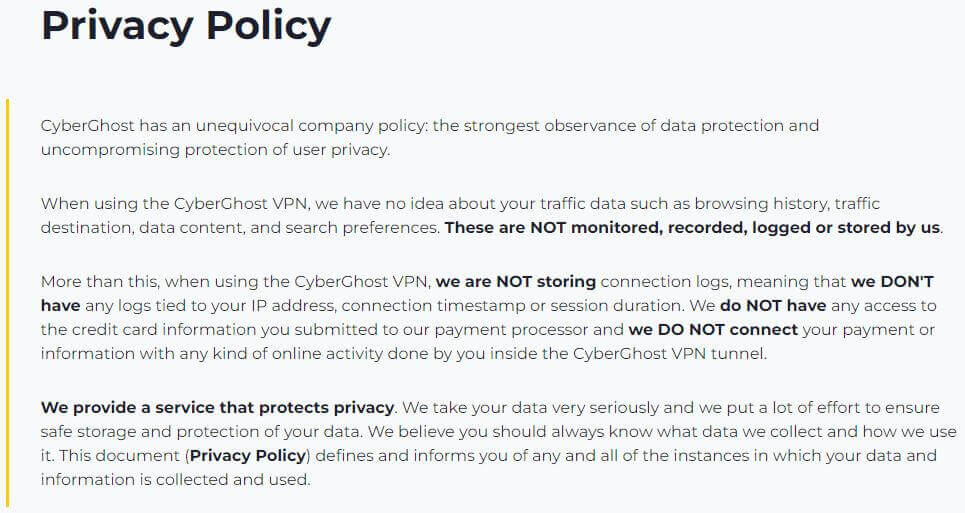
To that, we should add the fact that the provider stores only minimal logs to keep the service afloat. This includes anonymized service info for troubleshooting, your email address, and payment info to be able to charge you for the subscription.
CyberGhost even has transparency reports published four times a year, which is a great practice for increasing the level of trustworthiness. In addition, the VPN has a security audit from Deloitte to back up its claims. Surfshark comes with a security audit from Cure53 and Deloitte, so it has one more audit.
This audit adds a lot to Surfshark’s credibility and boosts its trustworthiness further. The provider resides in the Netherlands and having this location in mind, one would doubt the provider really stores any logs. But hey, it’s hard to argue against two audits from some of the biggest auditors in the world.
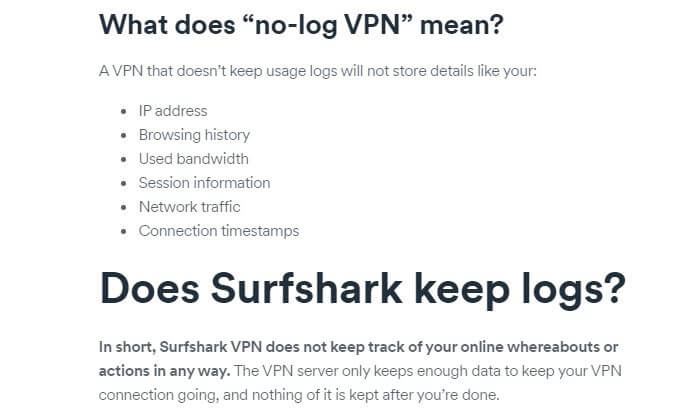
As you can see, the provider keeps no logs of your browsing history, network traffic, IP address, used bandwidth, connection timestamps, session information, etc. Since it keeps no such information, it also can’t track your location or see what you’re doing online while using the VPN.
Much like CyberGhost, Surfshark stores only mandatory logs that are needed for this kind of service to function properly. With RAM-based obfuscated servers, you’ll have no issues with privacy because each server restart results in the loss of the information stored on that server.
Who Wins?
This part of the comparison was pretty tight, as both Surfshark and CyberGhost displayed the highest levels of privacy and security. They both have no-logs policies and unique security features that make them excellent. As such, we call this round a DRAW.
CyberGhost vs Surfshark Streaming Test
People who are looking to get a new VPN will also be interested in its streaming capabilities. Let’s be honest – the #1 use case of a VPN is streaming on Netflix, Hulu, Disney+, BBC iPlayer, and other geo-restricted streaming services.
Many people ask me – do I really need to use a VPN for streaming? And, as always, my answer is YES but only if we’re talking about a provider that’s capable of unblocking popular streaming platforms. The good news is that Surfshark and CyberGhost offer that capability.
Netflix Test
Of course, when talking about streaming, the first platform that comes to mind is Netflix. It’s pretty annoying knowing that each country gets a different catalog, which is why many people are looking to get an IP from another country in order to access another catalog.
The best Netflix libraries are the ones in the US, Canada, and Japan where you can find tons of great series, movies, and anime. For that very reason, I tested these providers on these 3 libraries to see if they can be unblocked using CyberGhost and Surfshark.
In the results below, you can see that Surfshark is quite a pleasant surprise, as it managed to outperform its rival by a tiny margin. It unblocked all three tested libraries, with CyberGhost failing to unblock Netflix Japan.
CyberGhost
- Netflix US (Grey’s Anatomy): OK
- Netflix Canada (Midnight in the Switchgrass): OK
- Netflix Japan (Naruto Shippuden): NOT WORKING
Surfshark
- Netflix US: OK
- Netflix Canada: OK
- Netflix Japan: OK
Other Streaming Platforms
Aside from Netflix, you can find tons of other streaming platforms that provide the same great experience. However, since we already tested a paid platform, I think it’s time to test free streaming services like Hotstar and BBC iPlayer.
These platforms are still very challenging to unblock for many providers, so they’re a good place to test Surfshark and CyberGhost. The good news is that we got some great results from both of them.
Who Wins?
In this round of my CyberGhost vs Surfshark streaming comparison, Surfshark WINS. It managed to unblock Netflix Japan unlike its rival, and while the rest of the tests were completed by both providers, it edges out CyberGhost by a tiny margin because it worked with one Netflix library more.
CyberGhost vs Surfshark: Speed Comparison
A quality streaming experience often has to do with great performance. Slow VPNs aren’t going to give you smooth 4K footage on Netflix or YouTube. In fact, many VPNs will slow down your internet speed a lot, resulting in unpleasant browsing, downloading, and streaming experiences.
With that in mind, you need a fast provider like ExpressVPN or NordVPN. Granted, these two are slower than the aforementioned giants but if you prioritize speeds over anything else, you might wonder which one is faster – CyberGhost or Surfshark?
Well, I tested both of these providers and I got some interesting results to share. But first, let me talk more about my testing parameters. I’m located in Europe and in the screenshot below, you can see what my native internet speeds look like:
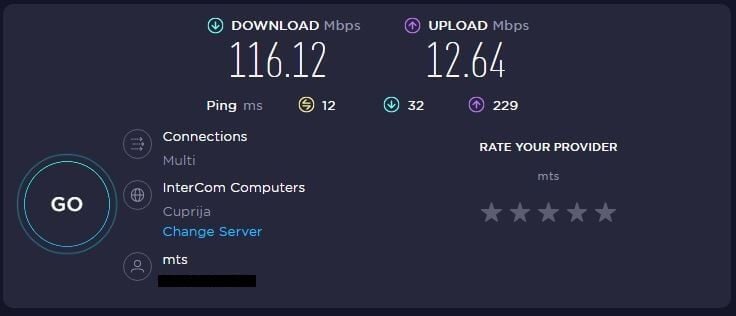
Now, I tested both providers for 3 days in a row, 3 times a day, using 4 different server locations. They include the UK, the US, Australia, and Japan, to make sure I encapsulate both near and distant servers for the most realistic results.
Important to mention is that I didn’t use necessarily WireGuard or OpenVPN protocols. Instead, I left this setting to Automatic and let these providers decide on the best protocol for my needs. With that said, I compiled the best results I got from both VPNs, so let’s check them out together.
CyberGhost
UK:
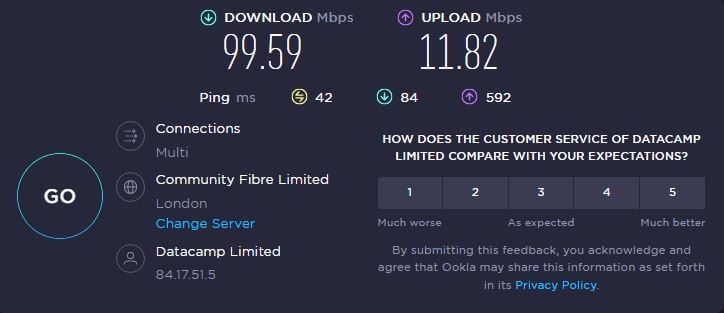
US:
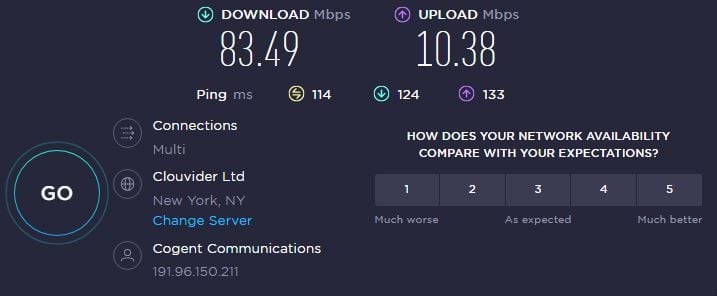
Australia:
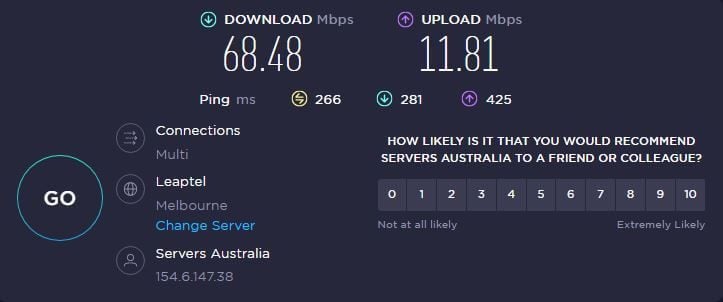
Japan:
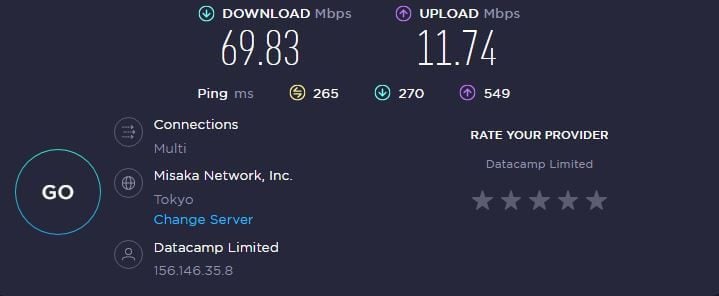
Surfshark
UK:
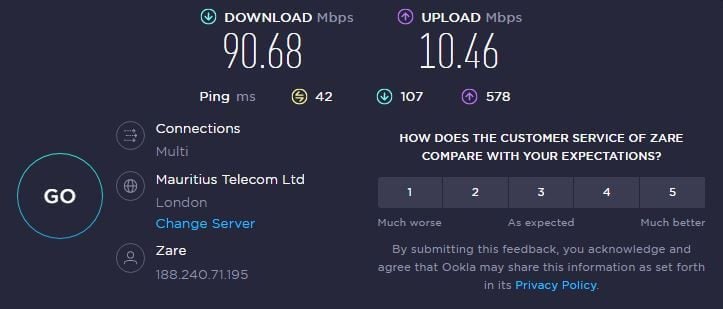
US:
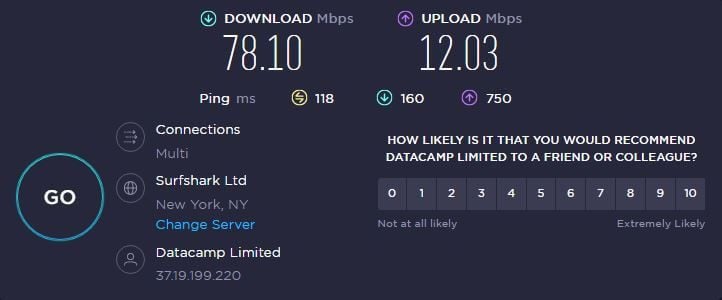
Australia:
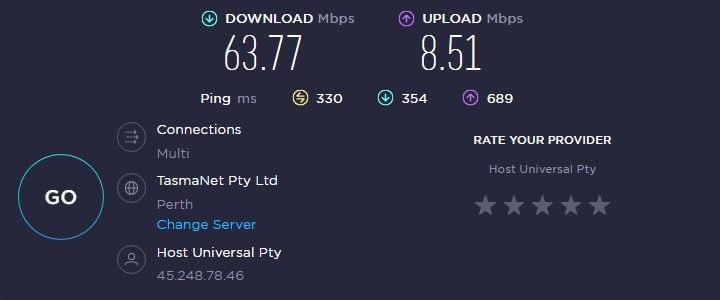
Japan:
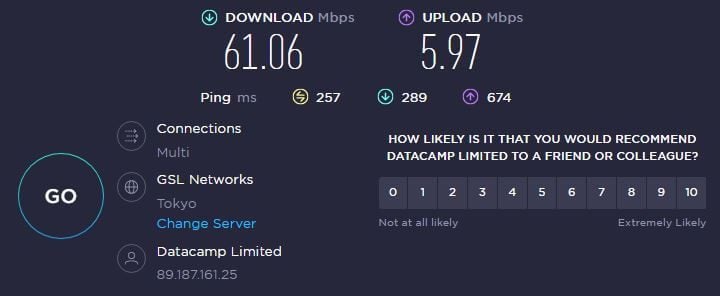
Who Wins?
In this part of my comparison, CyberGhost WINS because it’s faster than Surfshark. Regardless of the server location I used, the provider was undoubtedly faster, which proved very beneficial when using distant servers for streaming, downloading, and browsing.
Torrenting: Are Surfshark and CyberGhost P2P-Friendly?
Now that I touched on downloading, I should also talk about torrenting because it’s yet another important topic of this CyberGhost vs Surfshark comparison. Torrenting isn’t exactly loved by your ISP and the authorities and many users have serious consequences for downloading copyrighted files from torrent sites.
With a VPN, you can conceal your IP address and use torrent sites and clients safely. However, you should also never download copyrighted files even under the cover of a VPN because it’s still illegal. Nevertheless, torrenting sites aren’t safe either, as they’re known for collecting your IP and tracking your download history.
That’s why people often use NordVPN with uTorrent or any other combination of VPN and torrent clients. CyberGhost is a perfect example of a great P2P-friendly VPN provider. It offers dedicated torrenting servers in 70+ countries, making it easy to find one close to your location optimized for fast speeds.
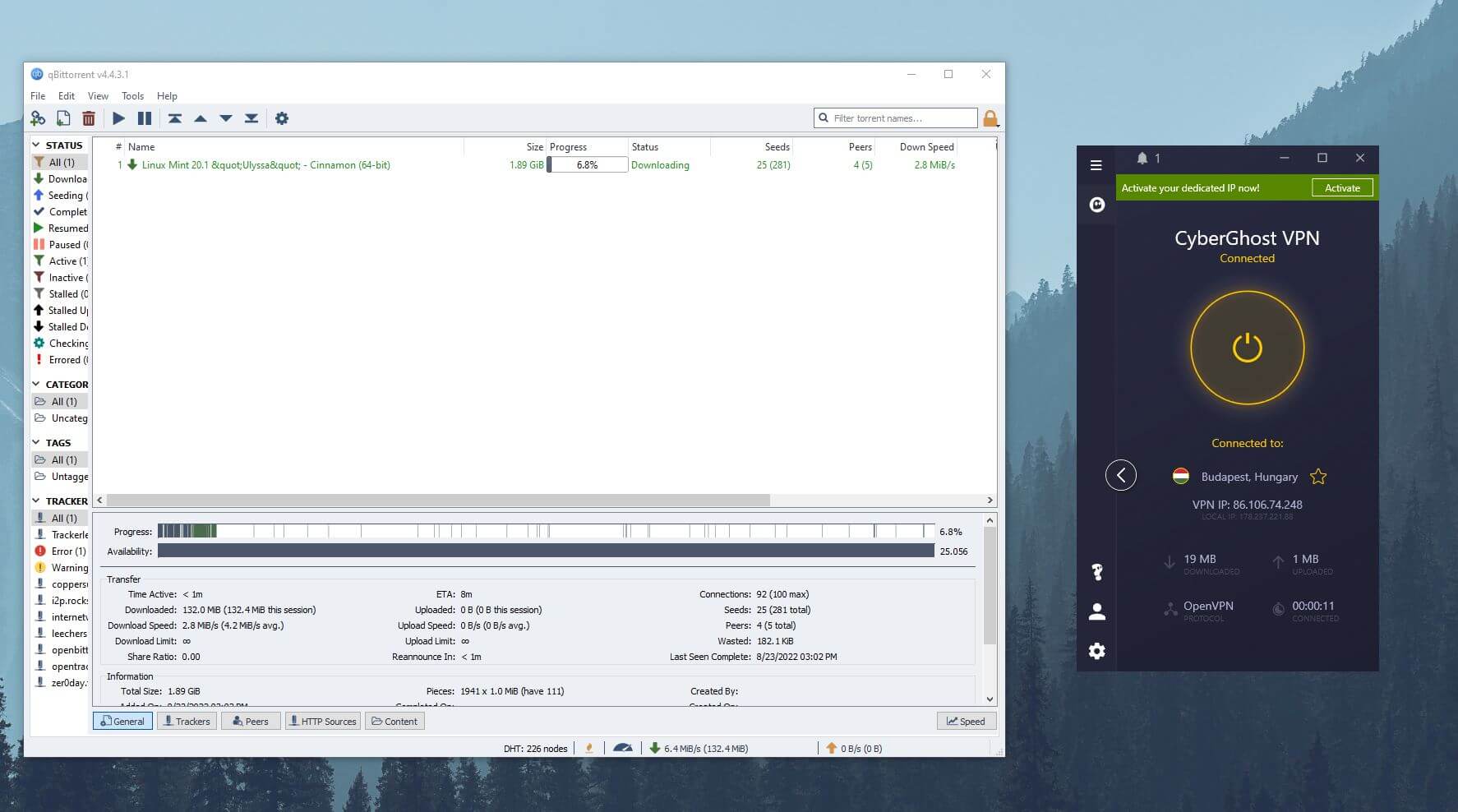
Its torrenting servers maintain great performance even when you’re connected to distant servers, which I found surprising. In the screenshot above, I used a server in Hungary to download Linux but when I used a server in the US, I noticed that my download/upload speeds barely took a hit.
This is the advantage of having servers optimized for particular activities. Surfshark, on the other hand, has only two types of special servers – MultiHop and Static IP. You don’t get P2P servers, meaning that every server in the network is suitable for this activity.
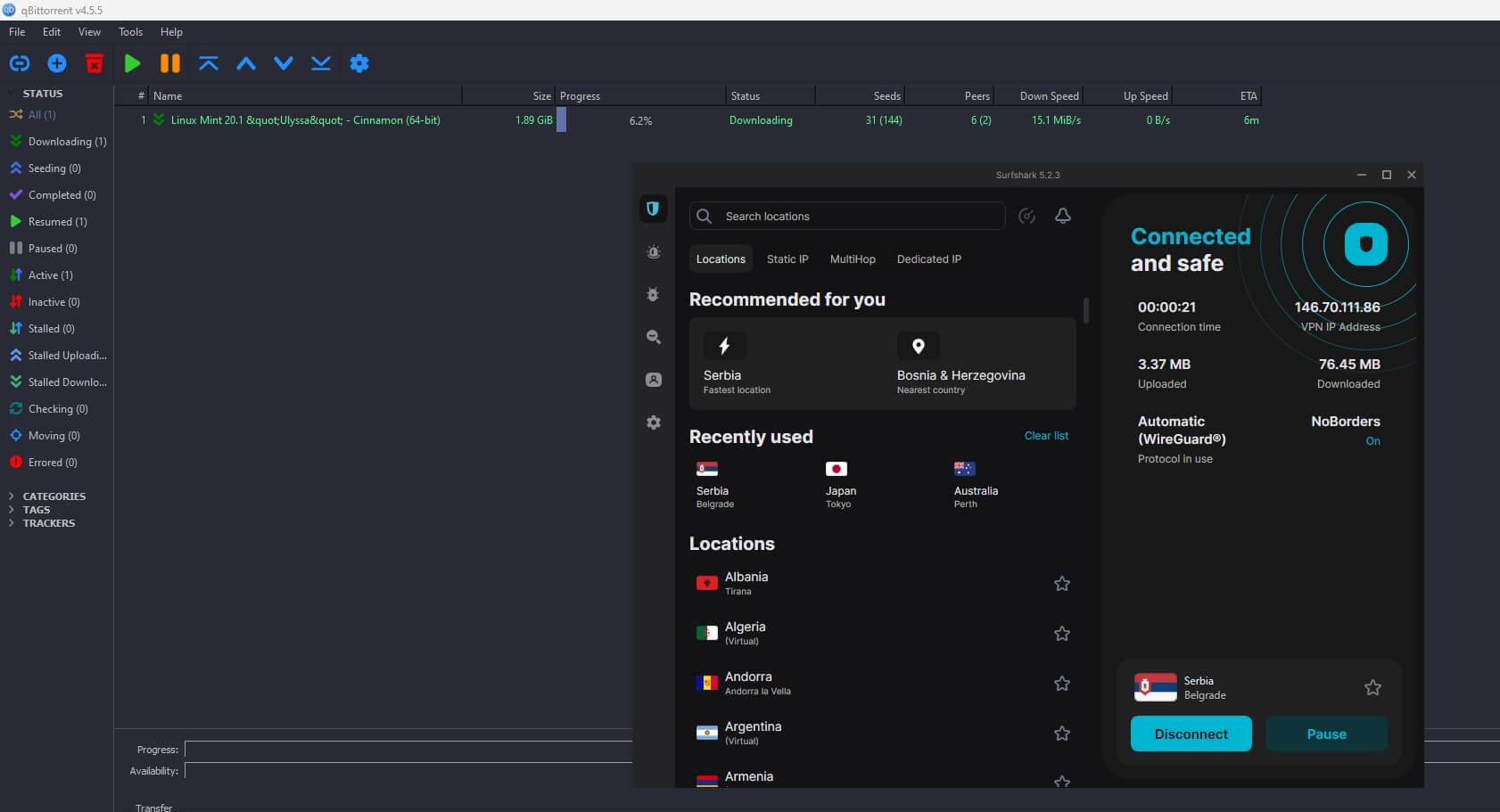
However, unlike CyberGhost, Surfshark showed some speed reductions when using more distant servers, such as those in the US or Japan, let’s say. It looks like not every server is properly optimized for P2P and that’s why speed reductions are noticeable when torrenting.
Who Wins?
In this Surfshark vs CyberGhost comparison, both providers are torrenting-friendly, so you won’t have issues with that. But it’s important to mention that CyberGhost provides better performance with faster upload/download speeds. That said, CyberGhost WINS this round of the duel.
Are CyberGhost and Surfshark Working in China?
Censorship and government surveillance are some of the most annoying things about the internet in general. In China, these practices are even more prevalent thanks to its Great Firewall, a strong censorship measure that blocks thousands of websites daily.
The Great Firewall blocks not only websites and apps but also VPN services that usually can’t get over this large obstacle. We already know that ExpressVPN and NordVPN work in China and these are your best choices if you’re living in this humongous country.
However, many people speculate that cheap VPNs aren’t suitable for this country, and in a way, they’re absolutely right. If we take CyberGhost as a prime example, it used to work in China long ago, when the country didn’t strengthen its firewall just yet.
As soon as the new censorship measures arrived, CyberGhost immediately stopped working, and even in 2025, it’s not a suitable choice. This provider has no obfuscation technology, which explains why the Great Firewall always detects and blocks it.
Surfshark has this NoBorders mode I talked about. It functions by making your VPN traffic look like ordinary traffic, which helps bypass firewalls and censorship in many countries. As you can guess, Surfshark indeed works in China and our testers had no issues using it in this country.
Thanks to the NoBorders mode, you can enjoy this provider not only in this country, but also in Russia, Turkey, and other censored countries and jurisdictions. This makes the provider a far better choice if you’re facing restrictions and censorship where CyberGhost won’t help you.
Who Wins?
It’s clear in this round that Surfshark WINS because it’s capable of bypassing censorship compared to its rival which doesn’t have obfuscation. Thus, if you live in China or you’re planning to go on vacation to this country, I highly recommend using Surfshark.
Surfshark vs CyberGhost Server Fleets: Which One Is Bigger?
Premium providers are known for their big server fleets that always outnumber the server networks of free providers. Having a bigger server fleet is always recommended to avoid overcrowding and ensure better performance across the board.
While both of these providers have what it takes in this regard, in this CyberGhost vs Surfshark comparison, there can only be one winner, so let’s take a closer look.
Surfshark (3,200 servers in 100 countries)
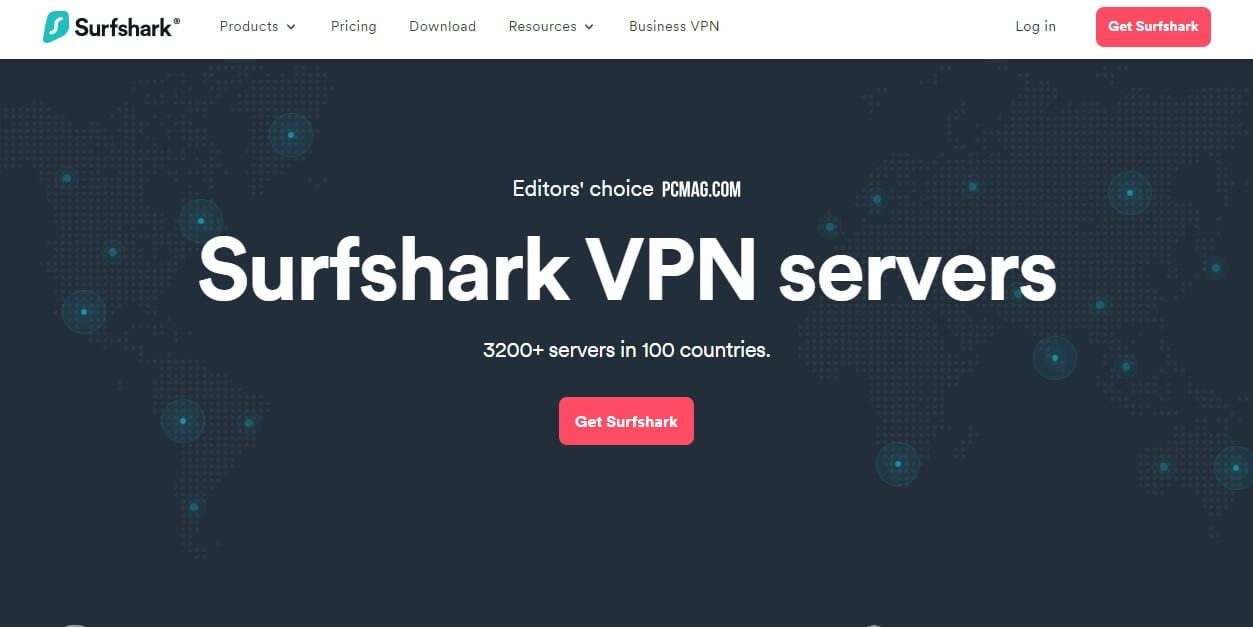
Surfshark is very impressive with its 3,200 servers in 100 countries around the globe. This is a big improvement over the old server park that counted just above 1,000 servers in 60 or so countries. Nowadays, this is a much bigger company with safe and secure servers across the planet.
The server distribution of Surfshark is great too, and you can find servers even in less popular countries. Surfshark has many server locations in the US, the UK, Canada, Australia, Germany, France, and other notable countries and locations.
Moreover, it uses 10 Gbps servers to ensure great performance, along with virtual servers in countries where having a physical infrastructure isn’t possible. There aren’t any particular dedicated servers either, except for MultiHop and Static IP servers in a few countries.
With 95 countries on offer, you surely won’t be disappointed with the servers and server locations. So far, I had zero issues with finding the server location I need while using this VPN. That said, I believe neither will you.
When it comes to dedicated IPs, you can purchase one from Surfshark at under $3.8 a month. This will be handy for avoiding captcha and preventing VPN blocks due to IP blacklisting.
CyberGhost (9,500+ servers in 100 countries)
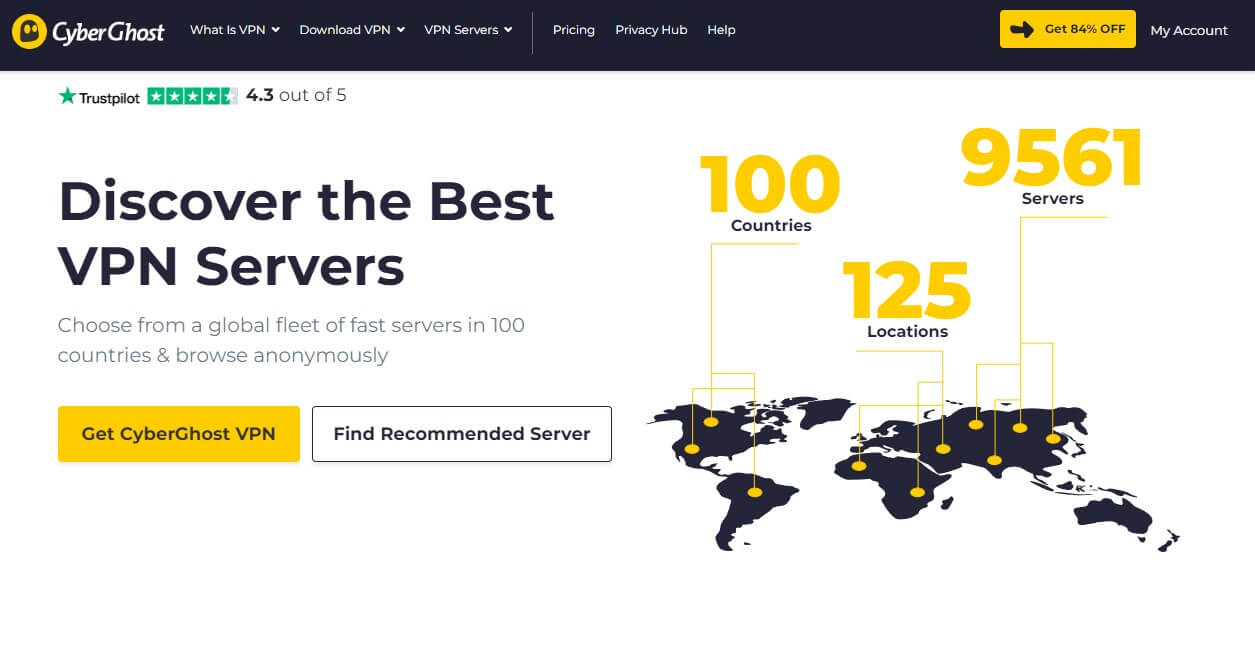
On paper, CyberGhost offers servers in 100 countries, which is the same compared to Surfshark. However, if you take a close look, you’ll see that it has 9,500+ servers, which is almost 3 times more than its rival. Is this number negligible? Well, take a guess!
The provider has nearly 1,500 servers in the US alone, plus many servers in Australia, the UK, and Europe in general. Not to mention its vast server fleet of servers in Africa and Asia, which complements an already impressive server list perfectly.
Unlike Surfshark, CyberGhost offers more server variety. As said, you get dedicated servers for streaming and torrenting, which I found convenient in many cases. Streaming servers are interesting because they’re optimized for a variety of platforms and foreign TV channels.
Then, you have the aforementioned NoSpy servers that will complement your privacy, as well as the option to get a dedicated IP address in more than 20 locations. The provider even shows you the distance to each server location, which is great if you’re looking to connect to the closest one.
Overall, the server fleet of CyberGhost is much more impressive in terms of numbers and variety. And if this is something you value the most, the choice should be obvious. Not to mention its cheaper dedicated IPs at around $2.5 a month that’ll surely save you money in the long run.
Who Wins?
This round was pretty easy and CyberGhost WINS it effortlessly. Not only does it have significantly more servers but its server variety is a lot better, making it a clear winner of this round.
Customer Support: Surfshark or CyberGhost?
Customer support won’t be as important as streaming capabilities, performance, or connection stability. However, if things go south and you need quick help, it’s good to know that a VPN has your back and is always there to respond to your questions.
In my full review of Surfshark VPN, I mentioned how much I liked its 24/7 support through live chat. I think the same about CyberGhost and its multi-language live chat support that’s here 7 days a week, 24 hours a day. In addition, both providers offer email support for those who aren’t in a hurry.
From my experience, both providers are extremely quick to respond and they fix issues and answer your questions swiftly. Furthermore, email support is yet another impressive factor here, as both VPNs won’t let you wait for a response for more than 30 minutes.
Unlike less popular providers, Surfshark and CyberGhost come with YouTube channels with moderate activity. CyberGhost is a bit more active in this regard, while Surfshark doesn’t post videos as often. Still, it’s great to see their experts talk about particular VPN-related stuff that’ll help you learn new things.
Other than that, both VPNs have Help Centers, FAQ sections, and other self-help methods that’ll get you going pretty quickly. In many instances, you don’t even have to contact support because everything you need is in their articles, making the problem-solving process much easier.
Who Wins?
Having in mind that CyberGhost and Surfshark have exceptional customer support teams, this round is a DRAW. Both of them have 24/7 live chat support, email support, and YouTube channels, so you can expect a great experience.
Pricing Comparison: How Cheap Surfshark and CyberGhost Are?
At the start of this CyberGhost vs Surfshark VPN comparison for 2025, I mentioned that we’re talking about cheap providers. In fact, they’re very similar in terms of pricing, which makes the decision on the user’s end that much more difficult.
So far, the duel is at a stalemate, with a score of 5:5, so it’s an interesting battle. This round, however, will bring us a winner which will be the cheaper VPN of the two.
Surfshark
Let’s talk about Surfshark first and see how much it’ll cost you to get its subscription.
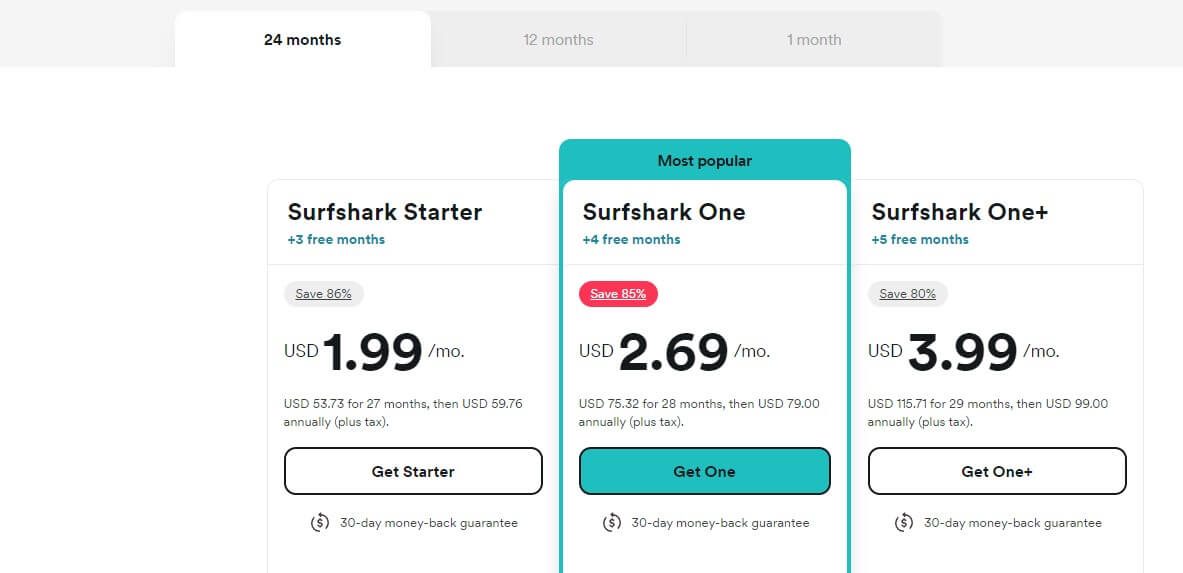
At the time of writing, this provider costs just below $2 a month for a 2-year plan where you get 3 free months at the moment. You’ll agree that this price is VERY affordable, especially when compared to ExpressVPN which costs $6.67 a month. This is for the Starter plan, though.
Surfshark has 3 variants of each subscription plan length. There’s the One plan with the bonus features we mentioned earlier at under $2.7 a month and 4 free months. However, the best deal, albeit the most expensive, is One+ at under $4 a month and FIVE free months.
This plan also lets you wipe your private data from databases but it’s valid only for people in the EU, the US, Australia, and Canada.
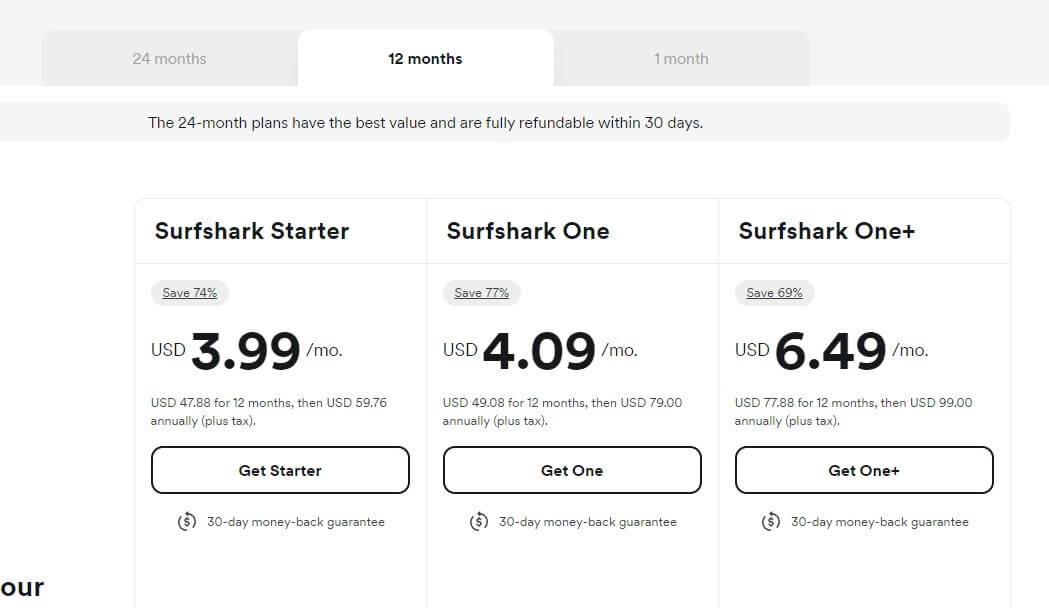
We can find the same plans if we switch to the annual variant. Here, you’ll pay more but for a short-term commitment. The One+ plan is now extremely expensive at under $6.5, while the One plan seems like the best deal and is shy of $4.1 a month. But what about its monthly plans?
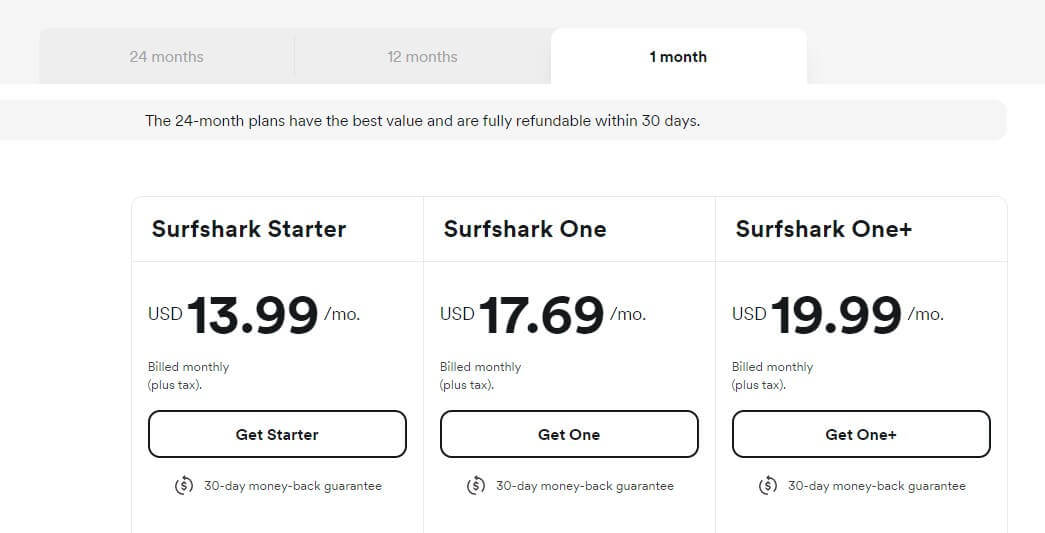
You can see they’re very expensive. Surfshark can cost you from $14 to $20 roughly, depending on the plan you choose. We’re against buying any of these plans. If you want to get it, the 2-year deal that you can get through our site is awesome at under $2 for the Starter plan.
When we think about it, suit yourself and get One or One+ plans if you think you’ll need additional features.
In addition, the provider has a 30-day money-back guarantee for all three plans, so if you’re not satisfied, you can always request and get a refund.
CyberGhost
Interestingly, at the time of writing this comparison, CyberGhost offered a 2-year plan with 4 free months at a very similar, albeit still lower price compared to its rival.

Once again, prices are prone to change but at this time, CyberGhost will charge you $2.03 a month, whereas, Surfshark’s price is $1.99.
Yes, it’s a small difference that’s negligible but we also must take into account that CyberGhost has 4 free months and its rival has “just” 3. Also, the renewal price of CyberGhost is cheaper, around $3 less per year, so if that plays a big part in your decision, that’s something to consider.
Finally, I should mention one big advantage that the Romanian provider has. It’s a 45-day money-back guarantee for plans longer than one month. This means you get 15 more days of risk-free use before you can get a refund – which is ideal for longer vacations abroad and bypassing geo-restrictions. More details can be found in our CyberGhost price analysis.
When it comes to bonus security bundles, CyberGhost is also cheaper. Surfshark One will cost you a lot more compared to the Standard plan while Security Suite for Windows will be just $1 a month on top of your subscription.
All of this makes the Romanian provider the best affordable provider you can get, which I further highlighted in my CyberGhost test.
Who Wins?
The final round of this comparison was pretty intense but CyberGhost WINS it nonetheless. It’s marginally cheaper (but still cheaper!), offering a bigger money-back guarantee period along with a more affordable bonus security suite for Windows.
Conclusion: CyberGhost Wins!
To conclude this CyberGhost vs Surfshark duel for 2025, I think it’s obvious we have a winner after a long, hard, and sweat-inducing battle. CyberGhost edges out Surfshark with a score of 6:5, making it a better solution for people on a “shoestring” budget.
This was a very close battle and on paper, with a higher score, the Romanian provider seems like a better choice. It’s better in terms of sheer performance, server fleet, and more affordable pricing, while Surfshark is better for streaming, bypassing censorship, and connectivity.
With that in mind, especially with a very similar price, you might be wondering which provider you should choose. Well, I’d say that choosing CyberGhost is a better decision because it’s more reliable and offers better performance at a slightly more affordable price.
However, if you live in a censored country or you often travel to such countries and you want to be able to stream effortlessly, Surfshark might be a better pick for you. Either way, make sure you get special discounts and offers on both of these providers through our site.
By clicking on the red buttons above, you can get the cheapest possible deal available at the moment, which will let you save even more money regardless of the provider you choose. And if you’re interested in any of the two providers, I’m sure saving some money will be more than welcome to you!